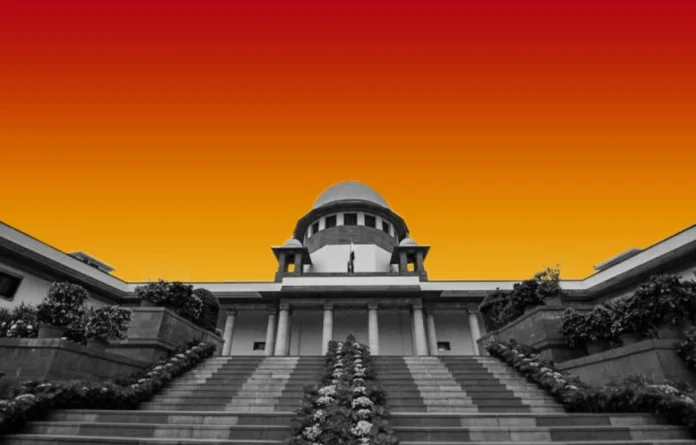The Supreme Court on Monday ruled that the Lieutenant Governor (LG) of Delhi had the power to nominate aldermen to the Municipal Corporation of Delhi without taking advice from the Delhi Government.
The Court observed that since it was a statutory power given to the LG and not an executive power of the government, the LG was expected to act as per the statutory mandate, and not as per the aid and advice of the Delhi government.
Earlier on May 17, 2023, the Bench of Chief Justice of India DY Chandrachud, Justice Narasimha and Justice JB Pardiwala reserved its decision on a petition filed by the Delhi Government challenging the LG’s decision.
The verdict was today delivered by Justice Narasimha.
The judgment stated that the verdict in the second GNCTD case clarified that if the Parliament made a law in relation to a subject in List 2 (State List) or List 3 (concurrent list), the executive power of the GNCTD would be limited to that extent.
Section 3(3)(b)(1) of the DMC Act 1957 provided that the LG could nominate 10 persons with special knowledge in municipal administration to the DMC. This power was introduced as per the amendment introduced in 1993.
Justice Narasimha observed that this law enacted by the Parliament (DMC Act) required the Governor to exercise the power to nominate. Hence, it satisfied the exceptions contemplated under Article 239AA(4) of the Constitution, whereby the Governor could act in his discretion.
The Bench rejected the argument that this power was a semantic lottery since it was specifically conferred by the 1993 amendment.
Reading out the conclusion of the judgment, Justice Narasimha said that the statutory power under Section 3(3)(b)(i) to nominate persons of special knowledge was vested in the Lieutenant Governor for the first time by the 1993 amendment of the DMC Act 1957 to incorporate Constitutional changes brought through Article 239AA and the introduction of Part IX related to Municipalities.
The power to nominate was, therefore, not a vestige of the past or the power of the administrator continuing by default. It was made to incorporate the changes in the Constitutional structure.
The text of Section 3(3)(b) of the Act as amended in 1993 expressly enabled the LG to nominate persons having special knowledge to the corporation.
The power expressed by the statute in the name of LG, also seen in the context of other provisions, demonstrated the statutory scheme in which the power and duties were distributed amongst authorities under the Act.
The context in which the power was located confirmed that the LG was intended to act as per the mandate of the statute and not guided by the aid and advice of the Council of Ministers. The power to be exercised was a statutory duty of the LG and not the executive power of the State, he added.
The Delhi government sought the quashing of notifications through which the Delhi LG appointed 10 members to MCD on his own initiative, instead of on the aid and advice of the Council of Ministers.
The petitioner claimed that the LG could not circumvent the elected government and make appointments to MCD on his own initiative. It contended that the word ‘Administrator’ contained in Article 239AA of the Constitution (Special Provisions with respect to Delhi) had to be read as Administrator/LG acting on the ‘aid and advice’ of the Council of Ministers.
The LG had two options – either to accept the proposed names recommended to him for nomination to MCD by the elected government, or to differ with the proposal and refer the same to the President.
Appearing for the Delhi government, Senior Advocate Dr AM Singhvi argued that for the past 30 years, the practice was that the LG did not make appointments without the aid and advice of the CoM.
The Senior Counsel mentioned the Constitution Bench decision of the Supreme Court in State (NCT of Delhi) vs Union of India (2018), which ruled that Article 239AA provided that the elected government of NCT of Delhi had exclusive executive powers over all subjects in the State and Concurrent List, apart from the three excepted subjects of ‘public order’, ‘police’ and ‘land’.
He argued that the power of nominations fell under Entry 5 of the State List, that is local government, which did not relate to any of the excepted subjects.
Appearing for the LG, Additional Solicitor General Sanjay Jain drew a distinction between the role of the LG under Article 239AA vis-à-vis his role as an Administrator when it came to local body nominations as per the Delhi Municipal Corporation (DMC) Act.
He submitted that the aid and advice of the Delhi government was not necessary for exercising the statutory power specifically conferred on the Administrator/LG under the DMC Act.
CJI Chandrachud orally remarked during the hearing that with the power to nominate members to MCD, the LG could effectively destabilise the democratically-elected MCD. This was in light of the fact that the aldermen got appointed to the Standing Committees and had voting power.


